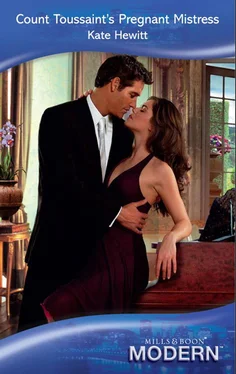Luc scanned the headlines and bylines with a distracted air, unable to voice even to himself what—who—he was looking for.
Then he saw it.
‘Piano Prodigy…pregnant?’
The photo was a blurry shot of Abby walking down a street in London. The newspaper had helpfully added a red circle to highlight the slight swell of her middle.
It only took up a few inches of space on the third page of the arts section. Abby, Luc realised, was hardly news any more.
Yet she was, it seemed, pregnant. And he knew without even a flicker of doubt that if there was indeed a baby then it was his.
He pushed the paper away, unfocused, unseeing, his mind spinning with thoughts he could barely articulate. The coffee at his elbow grew cold and the sun rose in the sky, casting longer and longer shadows on the floor.
Finally, as if shaking himself from a dream, Luc rose. He reached for his cellphone, flicking it open and punching buttons. When his assistant answered, he spoke tersely. ‘I need the jet. This morning.’
Luc snapped his cell shut and gazed out at the River Seine winding through the city, at the cherry trees just beginning to blossom. Then, turning away from the charming sight, he prepared to pack for his trip to England…to find Abby.
Kate Hewittdiscovered her first Mills & Boon® romance on a trip to England when she was thirteen, and she’s continued to read them ever since. She wrote her first story at the age of five, simply because her older brother had written one and she thought she could do it too. That story was one sentence long—fortunately they’ve become a bit more detailed as she’s grown older. She has written plays, short stories, and magazine serials for many years, but writing romance remains her first love. Besides writing, she enjoys reading, travelling, and learning to knit.
After marrying the man of her dreams—her older brother’s childhood friend—she lived in England for six years and now resides in New York State, with her husband, her four young children, and the possibility of one day getting a dog. Kate loves to hear from readers—you can contact her through her website, www.kate-hewitt.com
Count Toussaint’s Pregnant Mistress
By
 MILLS & BOON®
MILLS & BOON®
www.millsandboon.co.uk
Before you start reading, why not sign up?
Thank you for downloading this Mills & Boon book. If you want to hear about exclusive discounts, special offers and competitions, sign up to our email newsletter today!
SIGN ME UP!
Or simply visit
signup.millsandboon.co.uk
Mills & Boon emails are completely free to receive and you can unsubscribe at any time via the link in any email we send you.
To Anna and Brenda, for giving my girls a love of music. Thank you for all you do!! K.
THE applause had ended and a hushed silence came over the concert hall, a wonderful expectancy that gave the room—and Abigail Summers—an almost electric excitement.
She took a breath, her fingers poised over the keys of the grand piano on the centre stage of the Salle Pleyel in Paris, closed her eyes, and then began to play.
The music flowed from her soul through her fingers, filling the room with the haunting, tormented sounds of Beethoven’s twenty-third sonata. Abby was not conscious of the audience who sat in enthralled silence, who had paid nearly a hundred euros simply to listen to her. They melted away as the music took over her body, mind and soul, a passionate force both inside her and yet separate from her. Seven years of professional playing and a lifetime of lessons had taught her to completely and utterly focus on the music.
Yet, halfway through the Appassionata , she became…aware. There was no other word for the feeling that someone was watching her. Of course, several-hundreds of people were watching her, but this—he, for she knew instinctively it was a he—was different. Unique. She could feel his eyes on her, even though she didn’t know how. Why.
Who.
Yet she didn’t dare look up or lose her focus, even as her cheeks warmed and her skin prickled, her body reacting with sensual pleasure to a kind of attention she’d never experienced and couldn’t even be certain was real.
She found herself longing for the piece to end, all twenty-four minutes of it, so she could look up and see who was watching her. How could this be happening? she wondered with a detached part of her mind even as the music rippled from under her fingers. She’d never wanted a piece to end, had never felt the attention of one person like a spotlight on her soul.
Who was he?
Or was she just being fanciful, thinking that someone was there? Someone different. Someone, she felt strangely, for whom she’d been waiting her whole life.
Finally the last notes died away into the stillness of the hushed hall, and Abby looked up.
She saw and felt him immediately. Despite the glare of the stage lights and the sea of blurred faces, her eyes focused immediately on him, her gaze drawn to him as if by a magnet. There was something almost magnetic about it, about him. She felt as if her body were being irresistibly pulled towards him even though she remained seated on the piano bench.
He gazed back, and in the few seconds she’d had to look upon him her buzzing brain gathered only a few details: a mane of dark, slightly raggedly kept hair, a chiselled face, and most of all blue eyes, bright, intense, burning.
Abby was conscious of the rustling of concert programs, people shifting in their seats, the wave of speculative concern that rippled through the room. She should have started her next piece, a fugue by Bach, but instead she was sitting here motionless, transfixed, wondering.
She didn’t have the luxury of asking questions or seeking answers. Taking a deep breath, she willed herself to focus once more, to think of nothing but the music. The beauty.
Yet even as she began the piece by Bach, the audience seeming to sit back in their seats with a collective sigh of relief, she was still conscious of him, and she wondered if she would see him again.
Jean-Luc Toussaint sat in his seat, every muscle tense with anticipation, with awareness, with hope. It was an emotion he hadn’t felt in a long time—months at the very least, most likely years. He hadn’t felt anything at all. Yet when Abigail Summers, the world-renowned pianist prodigy, had come onto the stage he’d felt hope leap to life inside him, had felt the ashes of his old self stir to life in a way he had never thought to experience again.
He’d seen pictures of her, of course; there was a rather artistic photograph of her outside the Salle Pleyel, a graceful silhouette of her at the piano. Yet nothing had prepared him for the sight of her coming onto the stage: her head held high, her glossy, dark hair pulled into an elegant chignon, the unrelieved black evening-gown she wore swishing about her ankles. Nothing had prepared him for the response he’d felt in his own soul, for the emotions—hope, even joy—to course through him.
He’d tried to dismiss the feelings as mere desperate imaginings, for surely he was desperate? It was six months since Suzanne had died, and little more than six hours since he’d discovered her letters and realized the truth about her death. Had felt the blame and the guilt, corrosive and consuming.
He’d left the chateau and all of its memories for Paris, avoiding his flat or any of the remnants of his former life. He’d come to this concert as an act of impulse; he’d seen a billboard advert and he’d wanted to lose himself in something else, to not have to think at all, or even feel.
Читать дальше

 MILLS & BOON®
MILLS & BOON®










